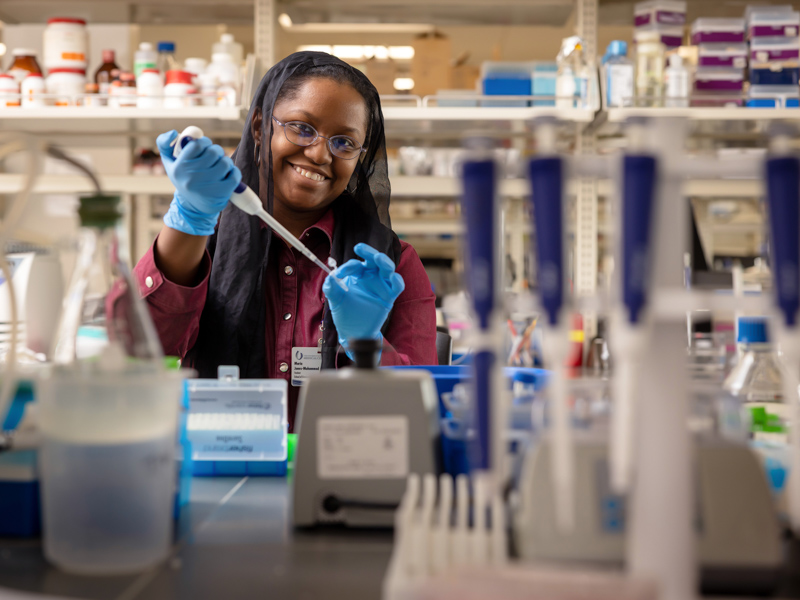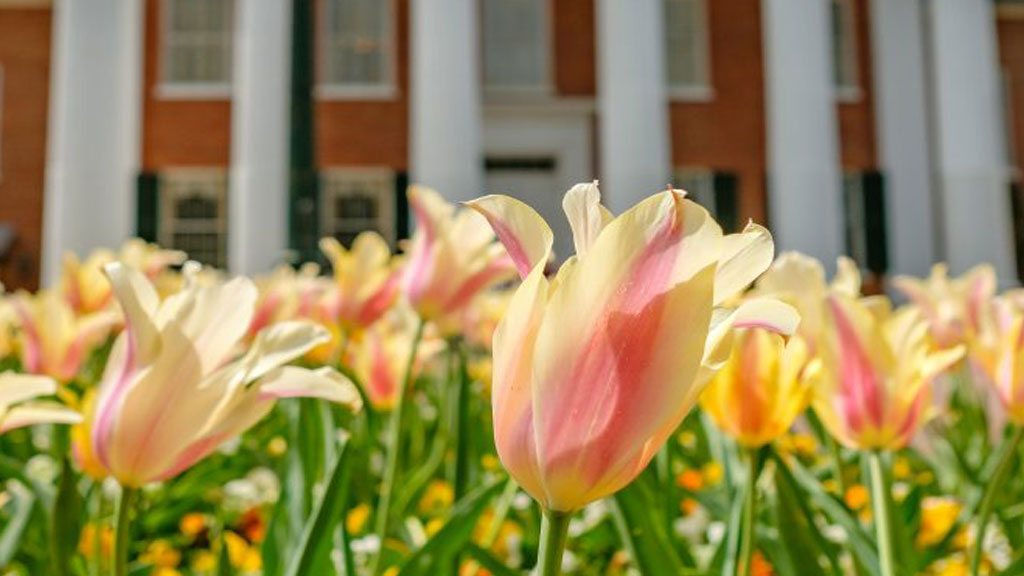Marie Jones-Muhammad follows her passion for science and research.
Middle school science fair projects may be a nuisance for some students, but Maria Jones-Muhammad’s project was the catalyst for what has become her passion.
It was her sixth-grade experiment on how music impacts learning that piqued her interest in the brain.
“It amazes me that the human brain is the least understood part of our bodies, yet we use it every day,” said the lifelong Jacksonian. “That’s why I chose to pursue a career focused on scientific exploration of the brain.”
“I’m excited about my journey to become an academic scientist and to one day train the next generation of scientists to be brave enough to learn something new and still be themselves in the process.”
— Maria Jones-Muhammad
Some 15 years later, Jones-Muhammad is counting down the days until commencement, when she will receive a PhD in neuroscience from the University of Mississippi Medical Center, the culmination of a five-year program.
“I love how interdisciplinary and diverse the neuroscience field is,” said the 27-year-old. “Based on the questions a researcher asks, collaborations can be made in almost any field of research, which is one of the many reasons why I enjoy neuroscience.”
With her training, she’ll have the knowledge and tools to investigate how environmental and biological factors affect the brain.
“By providing the health care field with information that can better inform the development of therapies to mitigate neurological issues, both bench science and clinical research can improve the lives of people worldwide.”

By all accounts, Jones-Muhammad is a homegrown UMMC scientist. During her junior and senior years at Murrah High School, she was shuttled from just across Woodrow Wilson Avenue for one hour a day to participate in Base Pair, a research mentorship program that pairs Medical Center faculty with students from Jackson Public Schools.
“I was amazed at the environment that UMMC had for students to learn, be innovative and explore different career paths,” she remembers. “I also loved that I had people around me willing to teach me about a career path that I did not know existed.”
Her mentor was Dr. Kevin Freeman, director, Office of Medical Student and Resident Research and professor of neurobiology and behavior research in the Department of Psychiatry and Human Behavior.
“Maria exhibited a level of focus and drive for becoming a neuroscientist at an age that is very rare. She was curious, interested and invested herself in the research topics for her work to a degree that is typical of an advanced college student.”
—Dr. Kevin Freeman, director, Office of Medical Student and Resident Research and professor of neurobiology and behavior research in the Department of Psychiatry and Human Behavior
“Maria exhibited a level of focus and drive for becoming a neuroscientist at an age that is very rare,” Freeman remembers. “She was curious, interested and invested herself in the research topics for her work to a degree that is typical of an advanced college student.”
That experience inspired Jones-Muhammad’s continued immersion into research, earning a BS in chemistry from Tougaloo College, where she was named a Howard Hughes Medical Institute scholar and Jackson Heart Study research assistant, and awarded internships from the Ronald E. McNair Post-baccalaureate Achievement program and Leadership Alliance Summer Research Early Identification program at Brown University.
The honors have continued at UMMC, where her accolades include six publications (five as first author), eight travel and presentation awards from national conferences, and about $113,000 in funding from the National Institutes of Health and the American Physiological Society Porter Fellowship. Perhaps most notable, she was the first from a Mississippi institution awarded the prestigious NIH F99/K00 Predoctoral to Postdoctoral Fellow Transition Award.
A mixture of excellent scholarly and research work ethic combined with a deep understanding of the science and top-notch ability to communicate her findings are at the heart of her “truly extraordinary” success, said Freeman.
“She is a very eclectic scientist and will do well as an independent researcher,” he said. “She is a real gem.”
“In her own right, Maria is an amazing scholar. She can put her accomplishments up against any graduate student and be proud. More than that, though, she is one of our own. She is an amazing representative of the PhD in neuroscience program, UMMC and Jackson.”
— Dr. Eric Vallender, associate professor of psychiatry and director of the program in neuroscience, agrees.
Dr. Eric Vallender, associate professor of psychiatry and director of the program in neuroscience, agrees. “In her own right, Maria is an amazing scholar. She can put her accomplishments up against any graduate student and be proud. More than that, though, she is one of our own. She is an amazing representative of the PhD in neuroscience program, UMMC and Jackson.”
Dr. Junie Warrington, associate professor of neurology, remembers, as a new faculty member with no direct contact with students, seeing Jones-Muhammad sitting “diligently” in a classroom before other students arrived.
“This dedication and work ethic caught my attention, and I could not help but ask her to consider my lab for a rotation,” said Warrington, who became her primary mentor and advisor. “I quickly noted that Maria is self-driven and ambitious. She never turned down a challenge. When I asked her to start working on a review paper during the first summer in the lab, she did not flinch even for a moment and had a draft of the paper before the end of the summer. In the lab, she is no different. She has set a high bar for future students to follow.
“I am her biggest sponsor, cheerleader and career coach and have no doubt she will excel in all her endeavors.”
As commencement approaches, Jones-Muhammad looks forward to finally being able to relax and recuperate with family, including husband Thristrum, before starting postdoctoral training at University of Alabama-Birmingham.
She admits the journey has had its challenges as she’s struggled to find a balance between completing her training and finding time for herself, physically and spiritually.
But it’s all been worth it, says Jones-Muhammad, the oldest of three who has come a long way from the child who dreamt of being a tap dancer, actress and real estate broker before being bitten by the science bug.
“I’m excited about my journey to become an academic scientist and to one day train the next generation of scientists to be brave enough to learn something new and still be themselves in the process.”
By Andrea Wright Dilworth, University of Mississippi Medical Center



